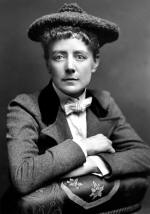 When Ethel Smyth's Mass in D received its premiere in London in
1893, the sold-out hall rang with applause. Here was a piece written by a woman
that had nothing "feminine" stamped on it. "It was your music that cured me
forever of the old delusion that women could not do man's work in art and all
other things," wrote George Bernard Shaw to the composer. "Your Mass
will stand up in the biggest company! Magnificent!"
When Ethel Smyth's Mass in D received its premiere in London in
1893, the sold-out hall rang with applause. Here was a piece written by a woman
that had nothing "feminine" stamped on it. "It was your music that cured me
forever of the old delusion that women could not do man's work in art and all
other things," wrote George Bernard Shaw to the composer. "Your Mass
will stand up in the biggest company! Magnificent!"
Mass in D was considered Smyth's masterpiece in a career that spanned six decades and included orchestral and chamber music, piano solos, song cycles and operas. Mark Shapiro, a choral expert and conductor of groups including Cecilia Chorus of New York, says it is an outrage that Mass in D has never been performed in New York.
"It's totally anti-woman," Shapiro says of the oversight. To right the wrong, as well as to continue his quest to bring worthy unknown works to light, he will lead Cecilia Chorus, soloists and orchestra in Mass in D at Carnegie Hall on April 14 at 2 PM. Scenes from the opera Maid of Orleans, by Peter Ilyich Tchaikovsky, are also on the program.
Shapiro says he discovered Mass in D accidentally while looking through scores at the New York Public Library. "The opening was so striking, I took it home," he says. "I love the whole piece!"
He says he admires the music for its "energy, expressiveness and intellectual vigor." "Throughout," he says, "there is a quality of strength, of sinew, of push that seems entirely congruent with the evident power of Dame Ethel's own personal will and determination to free herself from stifling familial and societal trammels."
Born in 1858, Smyth battled at a young age with her father, a Major-General in the Royal Artillery, who opposed her desire to study music. She prevailed, but after a year at Leipzig Conservatory she dropped out in order to study privately. Brahms, whom she met, gently teased her about her unorthodox educational background. "So this is the young lady who writes sonatas and doesn't know counterpoint!" he said.
In a memoir, she writes that she took his comment as a compliment, but later recognized its "scathing irony." Nevertheless, Shapiro says, there is nothing amateurish about Smyth's music.
Music aficionados believe she has been unjustly neglected. The reasons, Shapiro says, range from prejudices against female composers--think Fanny Mendelssohn, Nannerl Mozart, and scores of others--to Smyth's own fierce individuality.
"She studied in Germany, which was an unpopular choice," he says. "She wanted to write opera, not a big genre in England in the late nineteenth century." In addition, she had "a difficult, complicated personality," he says.
Known for her independence and an eccentric streak, she had a large circle of notable friends and admirers. These included, besides Shaw, Virginia Woolf; the conductor Sir Thomas Beecham; Tchaikovsky; and the Empress Eugenie, wife of Napoleon III. The empress was among those who helped Smyth arrange the first performance of Mass in D.
John Singer Sargent painted her portrait. Shapiro says there are passages in the Mass reflecting the "quiet, sweet, reflective, inward-looking" mood of the painting.
Smyth was a fierce supporter of women's rights. After meeting Emmeline Pankhurst, a political activist and the leader of the British suffragette movement (with whom she reportedly fell in love), she took time out from music to fight for the cause. During a campaign involving the large-scale smashing of shop windows, Smyth was arrested and sentenced to two months in prison. While there, she composed an anthem, March of the Women, which she famously conducted from her cell window with a toothbrush while women marched around the exercise yard.
Smyth received attention during her lifetime for her operas. One reviewer, discussing her opera The Prison, said: "Dame Ethel's genius goes beyond music; it is a genius of character, and it expresses itself in all the ways of her life…The Prison is one of the most remarkable works of our time."
When she began to lose her hearing at the age of 54, Smyth turned increasingly to writing. Her biographer Christopher St. John quoted her as saying: "If you find your former activities impossible, you must not be passively resigned to that, but find other activities that are possible." She wrote 10 books between 1919 and 1940, encouraged by Woolf.
"What you must do is continue," Woolf wrote to her. "You can't in justice to posterity and the present let your great fountain bottle itself up."
At age 64, Smyth received the Dame of the British Empire, the female equivalent of knighthood. At age 75 she was invited by Queen Mary to sit in the Royal Box for a music festival at which The Prison was performed. She died of pneumonia in 1944 in England at age 86.
Those performing the New York premiere of Mass in D--120 years after its premiere in London--might imagine the composer sitting in a box at Carnegie Hall, conducting with a toothbrush.
The Cecilia Chorus of New York will perform the New York premiere of Dame Ethel Smyth's Mass in D, along with scenes from Tchaikovsky's The Maid of Orleans on Sunday, April 14, 2013 at 2 PM at Carnegie Hall, Stern Auditorium/Perelman Stage. Ticket information is available at cecilachorusny.org.
Roberta Hershenson is a New York- based arts journalist whose work has appeared in The New York Times, Opera News, Classical Singer and NYCityWoman.com.
